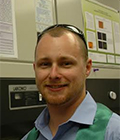
"Generation of an immune deficient mouse model of Huntington’s disease for efficacy testing of human cell based therapies"
Host lab: Jan A. Nolta
University of California, Davis
Huntington’s disease (HD) is an autosomal dominant neurodegenerative disorder afflicting nearly one in 10,000 people in the United States. Linked to expanded trinucleotide repeats in exon 1 of the huntingtin gene, HD causes death in 100% of those afflicted through an accumulation of protein aggregates and aberrant gene regulation. The disease is characterized by neuronal atrophy of the striatum which results in uncontrollable bodily movements, aggression, cognitive decline, and psychosis. Currently available treatments target only symptoms of the disease and there is no available therapy or cure. At the UC Davis Institute for Regenerative Cures we are developing a cell therapy designed to slow onset and progression through intracranial injections of Mesenchymal Stem Cells engineered to deliver brain derived neurotrophic factor, crucial to neuron maintenance and highly down regulated in HD, to injured neurons. Before any cell treatment can be introduced into the clinic, efficacy must first be shown in animal models. Efficacy testing of human stem cell therapies in animal models is challenged by a xenogeneic response by the animal resulting in rejection of the human cells. My project is to develop an immune deficient and xeno-tolerant animal model of Huntington’s disease to allow efficacy testing of these human cell based therapies without the need for highly toxic immune suppressants through the introduction of the Nod.Scid.Il2rg-/- background onto the full length human HD protein expressing Yac128 mouse model. Once completed, further manipulation through humanization of the mouse immune system through engraftment of umbilical cord derived hematopoietic stem cells may provide a more “allogeneic-like” system for efficacy testing of current and future human cell based therapies for HD.